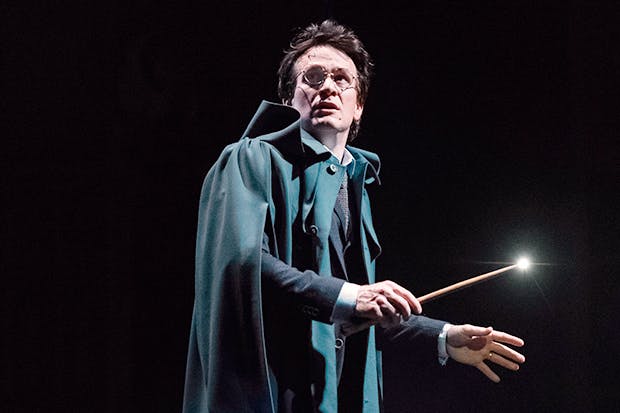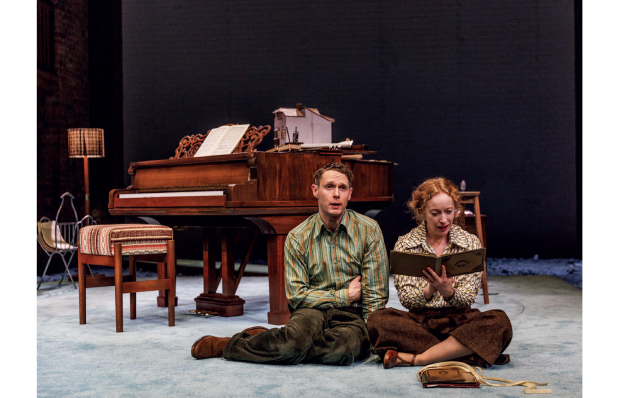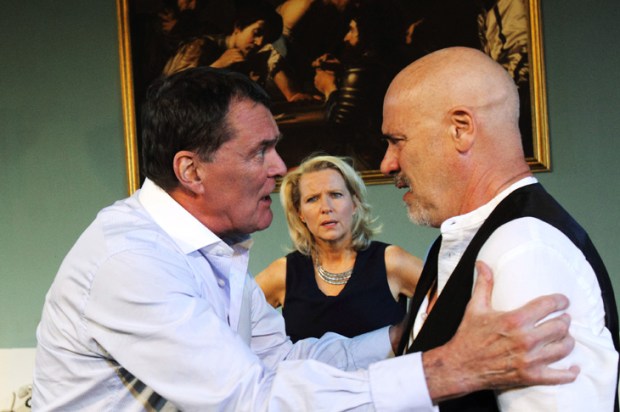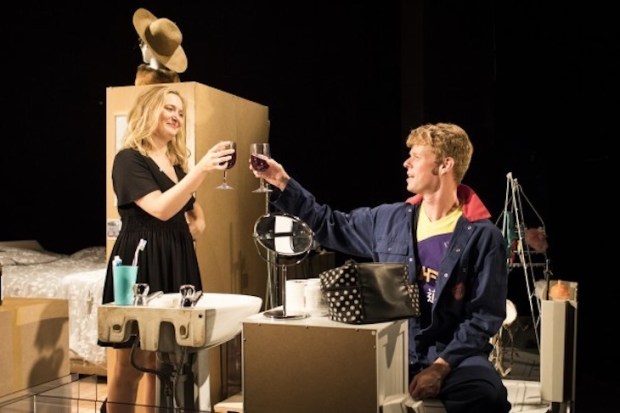Consider it commercially. So powerful is the pull of the Potter franchise that the characters could simply re-enact the plot of ‘Incy-Wincy Spider’ and the fans would swoon with joy. The stage show has been written by a two-man committee, Jack Thorne and John Tiffany, with the help of billionaire equality campaigner J.K. Rowling. Harry is now 37 and working as a Whitehall clodhopper at the Ministry of Magic. He’s troubled by his stompy bed-wetter of a son, Albus, whose tantrums cause the middle-aged miracle-worker to suffer agonies of weepy self-doubt. Together they visit Hogwarts and the multifarious plotlines start to punch each other in the face.
Three kids — Albus Potter, Scorpius Malfoy and Rose Granger-Weasley (the surnames will mean something to Hogwarts votaries) — must acquire a gizmo that will allow them to revisit history and make adjustments affecting the future. They succeed. Well done, chaps. But this means all the relationships have changed in the second act and everyone is married to the wrong person. Poor dull Rose has vanished altogether. Novices will find this mystifying. Ditto the storyline, which includes a trip back to the first book where little Harry recounts a nightmare involving Hagrid and the narky old boot who adopted him. Pretty haywire storytelling. The plot has to operate on four planes at once: two timelines (Harry as a kid and Harry as an adult), and two parallel universes (before and after Harry’s son got the time-hopping thingie). ‘Will somebody please explain what’s going on,’ begs one character. A sure sign the plot’s gone nuts.
The visual tricks are passably good. A robed character disappears — choom — into a telephone socket. But when the stunt is repeated with three robed characters it becomes obvious how the job was pulled. The dialogue is padded out with much pious screeching about ‘good parenting’ from Harry and fellow-wizard Draco, who’ve matured into a right pair of Barratt Home bores. ‘They say parenting’s the hardest job in the world. They’re wrong. It’s growing up,’ pontificates Draco, who has the power to travel in time but can’t transcend the bounds of his self-pitying suburban pomposity. He challenges Harry to a wand-waving duel in the kitchen but the effects are marred by the wire clasps conspicuously stitched to their costumes. Though the Ikea furniture cavorts in midair it’s clearly being manipulated by ‘invisible’ stagehands illuminated by light leakages. The tepid routine is ended by a mumsy crosspatch in an angry cardigan who orders the men to stop endangering her cupboards.
Part One over, we got a break. J.K. Rowling’s indentured peasantry queued meekly to fill their nylon knapsacks with plastic relics from the tat-shop. Heads bowed, they were oblivious to the kitsch glories of the Palace Theatre, whose sprawling ornamental intricacies are one of London’s overlooked treasures.
Then Part Two. Appreciably worse than its predecessor, I’m afraid. A malignant sorceress, looking like a plump Mrs Thatcher with a coiffure the size of an igloo, has seized power at Hogwarts. Harry and his one-dimensional chums must square up to the evil Tory witch, curtail her reign of infamy and make the world safe for socialist plutocrats. The dialogue quickly sinks to the lowest level of shock-horror platitude. Chortling baddies recite speeches about their invincibility while casually inflicting tedious brutalities on whimpering captives.
The muddled plot involves more time travel and more nostalgia for the early books. ‘We haven’t really thought this through,’ says Albus, a further sign of script troubles. The final hour consists almost entirely of befuddled characters explaining illogical slabs of narrative to each other. Hidden flame-throwers add a fleeting burst of spectacle to the climax. Virtue wins. Evil is vanquished. The departing Potter-fodder were handed badges proclaiming their unwillingness to reveal the show’s ‘secrets’ to the ticketless. Wow. That is terrific marketing. Nothing like an oath of silence to glamorise banality.
The Plough and the Stars, by Sean O’Casey, is a sprawling frieze that shows how Dubliners coped with the 1916 Rising. Pregnant Nora is desperate to stop her stick-in-the-mud husband Jack from enlisting. Bossy Bessie annoys the patriots by chanting ‘God Save the King’. Young Covey hopes the revolt will trigger a worldwide revolution. Self-righteous Fluther wants the struggle confined within Ireland.
This list of names and attitudes is how the play feels. The characters are tricksy, self-regarding, argumentative, hard to sympathise with. Too often they’re like catalogues of opinions rather than flesh-and-blood humans set adrift in real events. O’Casey springs a decent surprise at the end when the least-deserving personality gets felled by crossfire. And he gives us a wonderful pair of cockney soldiers whose stone-the-crows-me-old-blighter dialect is hilariously off-key.
This is an assured production of a timely, worthwhile play: informative, enjoyable, well-paced, visually stimulating and finely acted. But it didn’t move me. O’Casey just isn’t good enough.
Got something to add? Join the discussion and comment below.
Get 10 issues for just $10
Subscribe to The Spectator Australia today for the next 10 magazine issues, plus full online access, for just $10.














Comments
Don't miss out
Join the conversation with other Spectator Australia readers. Subscribe to leave a comment.
SUBSCRIBEAlready a subscriber? Log in